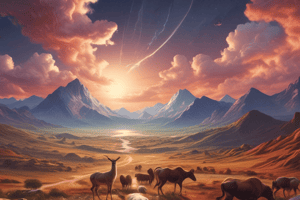Podcast
Questions and Answers
Which of the following best describes the study of the interactions among the atmosphere, lithosphere, hydrosphere, and biosphere?
Which of the following best describes the study of the interactions among the atmosphere, lithosphere, hydrosphere, and biosphere?
Which of these examples is best described as a type of tertiary industry?
Which of these examples is best described as a type of tertiary industry?
Which process is most closely associated with the formation of new rocks?
Which process is most closely associated with the formation of new rocks?
Which of the following terms describes the large-scale movement of people from one country to another?
Which of the following terms describes the large-scale movement of people from one country to another?
What does the concept of 'sustainable development' primarily focus on?
What does the concept of 'sustainable development' primarily focus on?
Which of the following terms relates most directly to the spatial relationships between economic activities and their surroundings?
Which of the following terms relates most directly to the spatial relationships between economic activities and their surroundings?
What is the primary distinction between a continental and a maritime climate?
What is the primary distinction between a continental and a maritime climate?
Which of these geological processes is LEAST likely to be directly involved in the long-term wearing down of mountains?
Which of these geological processes is LEAST likely to be directly involved in the long-term wearing down of mountains?
Which pairing best represents a non-renewable resource and a related extraction method?
Which pairing best represents a non-renewable resource and a related extraction method?
Which of the following best describes the 'Tertiary' sector of the economy?
Which of the following best describes the 'Tertiary' sector of the economy?
Flashcards
Wearing down of mountains
Wearing down of mountains
The process of breaking down mountains over time due to natural forces like erosion.
Geospheres
Geospheres
The layer of Earth consisting of rocks, minerals, and soil. It includes mountains, valleys, and the ocean floor.
Fracking
Fracking
The process of using a high-pressure mixture of water, sand, and chemicals to extract natural gas from rock formations.
Pangea
Pangea
Signup and view all the flashcards
Tertiary industry
Tertiary industry
Signup and view all the flashcards
Global Warming
Global Warming
Signup and view all the flashcards
Sustainable Development
Sustainable Development
Signup and view all the flashcards
Oil Sand
Oil Sand
Signup and view all the flashcards
Study Notes
General Purpose Maps
- General purpose maps display a wide variety of geographical information.
Wearing Down of Mountains
- Mountain erosion is a natural process.
Geospheres
- Geospheres are the Earth's different layers.
People Moving Countries
- Migration patterns track people moving between countries.
Types of Industry
- Industries are categorized by activity.
Climate
- Climate is the average weather over a long period in a specific area.
Renewable Resource
- Renewable resources, such as solar and wind, are replenished naturally.
Pangea
- Pangea was a supercontinent from millions of years ago.
Tertiary Industry
- Tertiary industries provide services, like transportation and tourism.
Type of Industry
- Industry sectors include manufacturing and agriculture.
Time Zone
- Time zones are geographical regions with consistent time.
Warming of the Earth
- Global warming involves rising Earth atmospheric temperatures.
Urbanization
- Urbanization is the growth of urban areas.
Location Factor
- Location factors influence industry placement.
Structure of Earth
- The Earth has layers (crust, mantle, core).
Fracking
- Fracking is a high-pressure method for extracting oil and natural gas.
Oil Sands
- Oil sands are alternative oil sources.
Sustainable Development
- Sustainable development considers environmental, social, and economic factors.
Non-renewable Resources
- Non-renewable resources (coal) are not replenished fast enough to meet demand.
Type of Map for Climate Regions
- Climate maps show different climate regions.
Type of Tree Cutting
- Forestry includes sustainable and unsustainable tree-cutting methods.
Continental/Maritime Climate
- Continental and maritime climates differ in temperature; maritime areas are generally milder.
New Rocks
- New rocks form through geological processes.
Rocky Mountains
- The Rocky Mountains are a large mountain range.
Studying That Suits You
Use AI to generate personalized quizzes and flashcards to suit your learning preferences.




